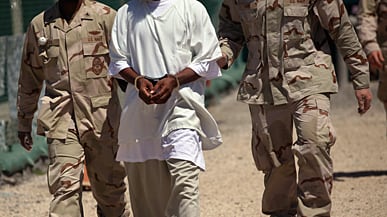WikiLeaks has dumped another trove of classified military documents, this time revealing chilling new details about the United States' extra-legal military prison camp at Guantánamo Bay. The documents give the most thorough picture yet of how the prison took shape, how its inhabitants were captured, and how many of them actually posed a threat to the U.S.

172 men are still locked up in the prison—almost all of whom are classified “high risk,” though the files also say a third of the 600 detainees already released also once had that classification. Also revealed:
Shocking Abuse of Inmates Mohammed Qahtani, a Saudi believed to have been an intended participant in the September 11 attacks, is said to have been leashed like a dog, sexually humiliated, and forced to urinate on himself. An Al Jazeera cameraman was held for six years for questioning about the television network's supposed training program.
Al Qaeda Threatens a ‘Nuclear Hellstorm’ In another chilling revelation, the files show that admitted 9/11 mastermind Khalid Shaikh Mohammed claimed that al Qaeda operatives had planted a hidden nuclear bomb in Europe, vowing to detonate it if Osama bin Laden were ever captured. They promised a “ nuclear hellstorm.” Attempts by al Qaeda to obtain nukes have been previously documented.
Hundreds of Innocent Men Locked Up At least 150 innocent people have been held in Guantanamo over the years, the files say. They include drivers, farmers, and chefs from Afghanistan and Pakistan who were swept up in the dragnet and sometimes held for years. In many of these instances, U.S. files indicate “ no reason recorded for transfer.”
Chilling Threats to American Guards Some documents reveal the terrifying threats that inmates issued to their American captors. One prisoner said "he would like to tell his friends in Iraq" to track down his interrogator, "slice him up, and make a shwarma out of him, with the interrogator's head sticking out of the end." Another mean threatened to kill his guard and "drink his blood for lunch."
Bin Laden’s Whereabouts on 9/11 Just four days after the terrorist attacks of 9/11, Osama bin Laden showed up at a guest house in Kandahar, Afghanistan. “Fight in the name of Allah,” he told the fighters who were there. Over the following months, the files claim, bin Laden used another guesthouse near Kabul to receive visitors. He escaped from his cave complex in Tora Bora in December of 2001—after borrowing $7,000 from a friend.
From Gitmo to Leading Libya’s Rebels One notable Guantanano inmate in the files is Abu Sufian Ibrahim Ahmed Hamuda Bin Qumu, a captive in the prison for five years who had been deemed a “probable member of al Qaeda” by the U.S. But now his relationship to America is more complex: Qumu, a native of Libya, is now a leading figure among that’s country’s rebel fighters against Col. Gaddafi. His Gitmo assessment says he has a “non-specific personality disorder.”
Pakistan Intelligence Service Labeled as Terrorism A damning document that surely won’t help strained relationships between the U.S. and Pakistan: The main Pakistani intelligence service, ISI, was listed by American authorities as a terrorist organization—on par with al Qaeda, Hamas, and Hezbollah. “Through associations” with these groups, the documents say, the ISI was linked to “terrorist or insurgent activity.”
The big picture is of an institution stuck in the past: No new prisoners have arrived at Guantánamo since 2007, and many have been there for several years, yet interrogators continue to question them about crimes increasingly distant in time. One detainee was captured in 2002, but was still being questioned about the whereabouts of Taliban chief Mullah Muhammad Omar six years later.
In a statement, the U.S. government condemned release of the materials: “It is unfortunate that The New York Times and other news organizations have made the decision to publish numerous documents obtained illegally by WikiLeaks concerning the Guantanamo detention facility. These documents contain classified information about current and former GTMO detainees, and we strongly condemn the leaking of this sensitive information."






